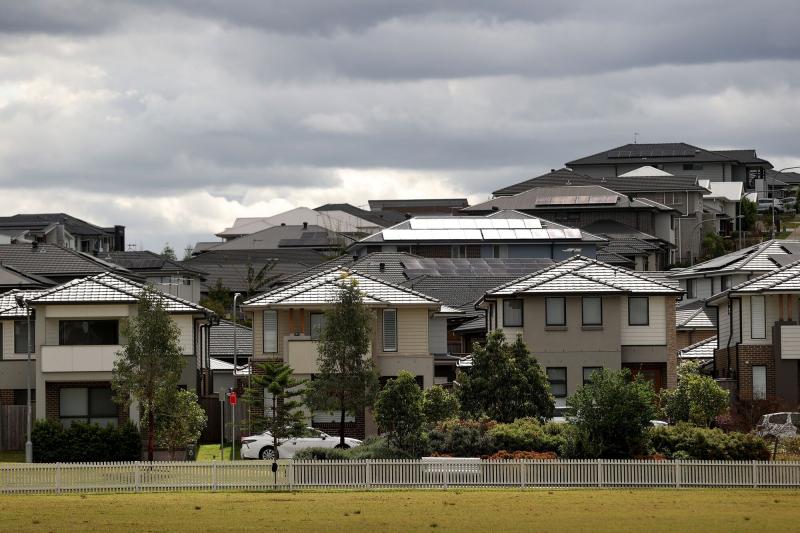Australian house prices declined for the first time in 22 months last month as buyers increasingly found themselves priced out of the market, while the supply of properties increased.
The Home Value Index for major cities slid 0.2 percent for its first fall since February 2023, property consultancy CoreLogic Inc said yesterday. Melbourne and Sydney, the two biggest markets, led the declines with drops of 0.7 percent and 0.6 percent respectively.
On the other side of the country, Western Australia’s state capital Perth led gains with a 0.7 percent increase, followed by the southern city of Adelaide, up 0.6 percent. Those two cities also recorded the largest annual gains of 19.1 percent and 13.1 percent respectively. Yet even here the pace of appreciation had slowed in recent months.

Photo: Bloomberg
“Growth in housing values has been consistently weakening through the second half of the year, as affordability constraints weighed on buyer demand and advertised supply levels trended higher,” said CoreLogic research director Tim Lawless said.
“With worsening affordability constraints and reduced borrowing capacity, we have seen buyer demand pushed toward lower-priced markets,” he said.
Higher interest rates, a shortage of homes and booming population growth have triggered a housing crisis in parts of Australia. The problem has been particularly acute in Sydney where buyers are being priced out of the market given an average home costs 13 times income.
Yet costs have now reached such a level that, combined with interest rates at a 13-year high of 4.35 percent, buyers are simply unable to raise the funds required to purchase a home. As a result, rents have also soared, though that market also ended the year on a softer note, CoreLogic said, citing a rise in the size of households in major cities and a cooling in migration.
“The final months of 2024 have set the framework for a soft start to 2025,” CoreLogic said. “However, as with 2024, we could likely see another year of multi-speed conditions, with the potential for a modest rebound in value growth once interest rates start coming down.”

SEMICONDUCTORS: The German laser and plasma generator company will expand its local services as its specialized offerings support Taiwan’s semiconductor industries Trumpf SE + Co KG, a global leader in supplying laser technology and plasma generators used in chip production, is expanding its investments in Taiwan in an effort to deeply integrate into the global semiconductor supply chain in the pursuit of growth. The company, headquartered in Ditzingen, Germany, has invested significantly in a newly inaugurated regional technical center for plasma generators in Taoyuan, its latest expansion in Taiwan after being engaged in various industries for more than 25 years. The center, the first of its kind Trumpf built outside Germany, aims to serve customers from Taiwan, Japan, Southeast Asia and South Korea,

Gasoline and diesel prices at domestic fuel stations are to fall NT$0.2 per liter this week, down for a second consecutive week, CPC Corp, Taiwan (台灣中油) and Formosa Petrochemical Corp (台塑石化) announced yesterday. Effective today, gasoline prices at CPC and Formosa stations are to drop to NT$26.4, NT$27.9 and NT$29.9 per liter for 92, 95 and 98-octane unleaded gasoline respectively, the companies said in separate statements. The price of premium diesel is to fall to NT$24.8 per liter at CPC stations and NT$24.6 at Formosa pumps, they said. The price adjustments came even as international crude oil prices rose last week, as traders

SIZE MATTERS: TSMC started phasing out 8-inch wafer production last year, while Samsung is more aggressively retiring 8-inch capacity, TrendForce said Chipmakers are expected to raise prices of 8-inch wafers by up to 20 percent this year on concern over supply constraints as major contract chipmakers Taiwan Semiconductor Manufacturing Co (TSMC, 台積電) and Samsung Electronics Co gradually retire less advanced wafer capacity, TrendForce Corp (集邦科技) said yesterday. It is the first significant across-the-board price hike since a global semiconductor correction in 2023, the Taipei-based market researcher said in a report. Global 8-inch wafer capacity slid 0.3 percent year-on-year last year, although 8-inch wafer prices still hovered at relatively stable levels throughout the year, TrendForce said. The downward trend is expected to continue this year,

POWERING UP: PSUs for AI servers made up about 50% of Delta’s total server PSU revenue during the first three quarters of last year, the company said Power supply and electronic components maker Delta Electronics Inc (台達電) reported record-high revenue of NT$161.61 billion (US$5.11 billion) for last quarter and said it remains positive about this quarter. Last quarter’s figure was up 7.6 percent from the previous quarter and 41.51 percent higher than a year earlier, and largely in line with Yuanta Securities Investment Consulting Co’s (元大投顧) forecast of NT$160 billion. Delta’s annual revenue last year rose 31.76 percent year-on-year to NT$554.89 billion, also a record high for the company. Its strong performance reflected continued demand for high-performance power solutions and advanced liquid-cooling products used in artificial intelligence (AI) data centers,